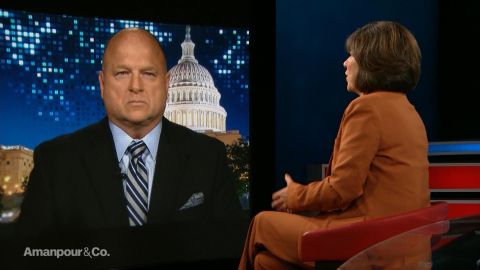Read Transcript EXPAND
AMANPOUR: Could he just declare a state of national emergency and remove money from one agency to fund another one, take it from the military to fund his wall?
URBAN: Well, this president likes to push the limits of presidential executive power. I suppose he could do that, he’d be challenging the courts, I believe. Also, the president just can’t simply reallocate funding without some congressional authorization. He can do it at a certain limit but there is — there are limits as to how much money he can reallocate and move around. But, you know, that the president can issue an executive order, you’ve seen it done in the past, and do that a national — declared a national emergency and do it. But I imagine he’d be challenging the courts quite quickly. So, I think that would be the last step. And he is — as you point out, he’s going to the border on Thursday. So, I don’t think you’ll see any resolution before at least that visit.
AMANPOUR: Well, what do you think then he would — he will do at the border? What — how will he use that visit to the border? What’s the point?
URBAN: Christiane, I think that the president’s going to reiterate his — you saw that his acting budget director sent a letter to Democrats laying out and outlining the things that the administration would like to see done. There is a humanitarian crisis on the southern border and then heading from the countries out Salvador, Honduras and Nicaragua, as you know, in the northern triangle there below Mexico. The president would like to see the administration, like to $8 million more for humanitarian aid for beds, helping process some of these refugees that are coming in, there’s a comprehensive letter that was sent for to Democrats. I think the president will use that to highlight his proposals.
AMANPOUR: OK. So, that’s interesting because that would show a sort of more humanitarian side of an administration that’s widely considered internationally to being very harsh at that border. But I do want to, you know, question you more about this issue of the Democrats. So, Chuck Schumer, Senator, Minority Leader, has detailed the quite detailed compromise that he and others leaders in the House now have apparently proposed to the president, this was before Christmas, in the early days, whereby they had a proposal that would open, you know, most of the government and let most of the government carry on with the work of the American people while still, you know, continuing to negotiate over this one demand of the president. The president didn’t accept it, you know, the Congress didn’t accept it. Why not? If you really want to get the government working.
URBAN: Sure, sure. Because I think you give up. The president viewed it as giving up all his leverage if he agreed to that proposal, he had given up every bit of leverage. Look, Christiane, the U.S. budget, as you know, is trillions of dollars, trillions, and the president is asking for $5 billion, which is a relatively small amount to secure the southern border, he views it as one of his most important — one of his most important jobs is keeping America safe, keeping our borders secure.
About This Episode EXPAND
Christiane Amanpour speaks with David Urban about President Trump’s 2020 campaign; and Kori Schake about America’s global leadership in 2019. Hari Sreenivasan speaks with musician and actor Lenny Kravitz about his life and career.
LEARN MORE


